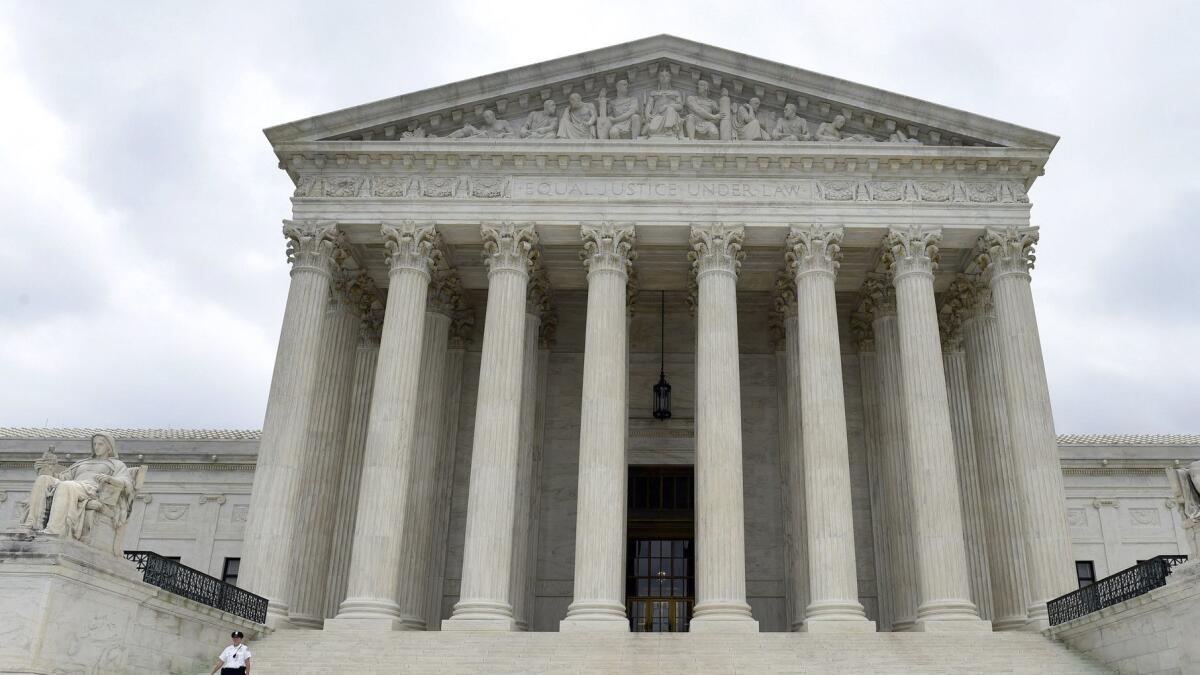Gorsuch casts key Supreme Court vote to spare California immigrant from deportation

With Justice Neil M. Gorsuch casting the deciding vote, the Supreme Court on Tuesday spared a California immigrant from deportation because his conviction for home burglary was not the kind of “aggravated felony” that would require removing him from the country.
The decision narrows one provision of a broad federal immigration law that calls for mandatory deportation for noncitizens — including longtime lawful residents — who are convicted of a crime that involves a “substantial risk” of force or violence.
Federal law makes clear that dozens of violent crimes, including murder, rape and robbery, would trigger deportation, but the justices have struggled in recent years to decide which other state crimes qualify as aggravated felonies under federal law.
A federal immigration judge had decided James Dimaya, a native of the Philippines who immigrated legally and had lived in Northern California since 1992, was slated for deportation because he had pleaded guilty twice to residential burglary under California law. Though a lower court found Dimaya had gone into an unoccupied home, the immigration judge found that a residential burglary is a crime of violence because it carries a “substantial risk” that “physical force” may be used, citing the words of the law.
But by a 5-4 vote, the justices reversed that ruling Tuesday and held that the burglary law is too vague and uncertain to be deemed a crime of violence in all instances.
It marked the first time that Gorsuch, President Trump’s appointee, joined with the four liberals to form a majority.
A spokesman for the Department of Homeland Security criticized the ruling. “By preventing the federal government from removing known criminal aliens, it allows our nation to be a safe haven for criminals and makes us vulnerable as a result,” said Press Secretary Tyler Q. Houlton.
The ruling in Sessions vs. Dimaya was a defeat for the Trump administration. Lawyers for the Obama administration had taken a similar position, first appealing the case in 2016 and urging the court to uphold the deportation decision.
The justices differed on whether the ruling would have a significant impact beyond home burglaries. While the dissenters said it would cast doubt on other crimes such as racketeering and money laundering, the majority said it would only prevent the government from relabeling crimes such as car burglary or residential trespassing as violent offenses.
“The Supreme Court delivered a resounding message today: You can’t banish a person from his home and family without clear lines, announced up front,” said New York lawyer Joshua Rosenkranz, who represented Dimaya. “Congress cannot write a mushy standard that leaves it to unaccountable immigrant officials and judges to make it up as they go along.”
Justice Elena Kagan, speaking for the court Tuesday, relied heavily on a ruling handed down by the late Justice Antonin Scalia in 2015. He said then the court would not add an extra 15-year prison term for “armed career criminals” unless Congress spelled out what it meant by a violent felony. The law had been interpreted in that case to apply to possession of a gun.
“Deportation is a particularly severe penalty,” Kagan said, and it is unconstitutional to mandate deportation based on a “hopelessly” vague provision.
Justices Ruth Bader Ginsburg, Stephen G. Breyer and Sonia Sotomayor agreed in full. Gorsuch agreed in part, and filed a separate opinion. “Vague laws invite arbitrary power,” he wrote. “They can invite the exercise of arbitrary power all the same — by leaving the people in the dark about what the law demands and allowing the prosecutors and courts to make it up.… Just take the crime at issue in this case, California burglary, which applies to everyone from armed home intruders to door-to-door salesmen peddling shady products. How, on that vast spectrum, is anyone supposed to locate the ordinary cases and say whether it includes a substantial risk of physical force? The truth is, no one knows.”
In August 2016, the Justice Department appealed to the Supreme Court after the U.S. 9th Circuit Court of Appeals, in an opinion by the late Judge Stephen Reinhardt in Los Angeles, ruled for Dimaya. He cited Scalia’s then-recent opinion on vague laws and said calling the California home burglary law a violent crime had the same flaw. It did not require evidence that the burglar actually broke into a home or used or threatened force.
To an unusual degree, the outcome in this case depended on Gorsuch.
The eight justices first heard the case in January 2017, shortly before Trump was sworn in, but they failed to issue a ruling by late June. They announced instead they would rehear the case in early October, making clear to all that Gorsuch would cast the deciding vote.
Chief Justice John G. Roberts Jr. dissented and said the law was reasonably clear. Justices Clarence Thomas, Anthony M. Kennedy and Samuel A. Alito Jr. agreed. In a second dissent, Thomas, joined by Kennedy and Alito, faulted the majority for declaring one provision of the law unconstitutionally vague.
UPDATES:
3:25 p.m.: The story was updated with comments from the Homeland Security Department and lawyer Joshua Rosenkranz.
10:40 a.m.: The story was updated with staff reporting.
The story was originally published at 8 a.m.
More to Read
Get the L.A. Times Politics newsletter
Deeply reported insights into legislation, politics and policy from Sacramento, Washington and beyond. In your inbox three times per week.
You may occasionally receive promotional content from the Los Angeles Times.







